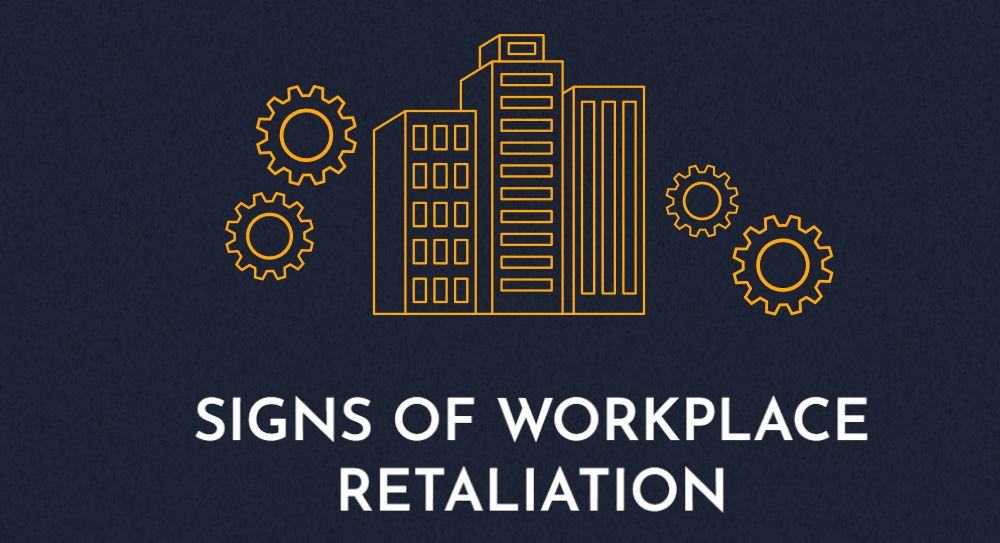
If you’re dealing with unfair treatment at work and suspect it might be retaliation, the key is to stay informed and proactive. Understanding the signs of retaliation at work and knowing your rights can set the stage for taking meaningful action.
Workplace retaliation is not as uncommon as you might think, but you don’t have to face it alone or feel powerless. By being aware of what this illegal practice looks like and how to address it with the help of experienced workplace retaliation lawyers, you’ll be in a better position to take action, protect yourself, and move forward confidently.
What Is Workplace Retaliation?
Workplace retaliation occurs when an employer takes negative actions against an employee in response to lawful, protected activities. Whether the retaliation is obvious or subtle, it can impair an employee’s ability to perform their job and create a hostile work environment.
Protected activities cover a spectrum of actions ensured under the law, such as:
- Reporting workplace harassment or discrimination
- Filing a complaint about unsafe working conditions
- Participating in an investigation as a witness or complainant
- Requesting accommodations for religious practices or disabilities
- Seeking fair pay, such as claiming unpaid overtime or wages
- Taking legally permitted leave under family, medical, or other employment laws
- Refusing to participate in illegal activities requested by an employer
Employers are prohibited from retaliating in such situations, and the law safeguards employees who step forward to address unlawful or unethical behavior.
How to Recognize the Signs of Retaliation at Work

Identifying retaliation in the workplace can be tricky. Understanding these signs can help you protect your rights and take the right steps toward resolving the issue.
Sudden Negative Changes in Job Status
One of the more obvious ways retaliation shows up at work is through changes to your job status or responsibilities. Common examples include:
- Being demoted or losing responsibilities that were previously part of your role.
- Unjustified terminations that lack proper reasoning or seem sudden.
- Having projects reassigned to others for vague or non-existent reasons.
While changes in job roles can sometimes occur for legitimate reasons, the timing often tells a story. If this coincides with reporting illegal activity or asserting your rights, it’s a red flag you shouldn’t ignore.
Unfair Performance Reviews
Performance reviews are a standard tool for evaluating employees. Still, they can also be weaponized against someone who has filed a complaint or taken protected action. Have you noticed that evaluations you once excelled in are suddenly critical without basis? Here are some signs to watch for:
- Receiving poor feedback that directly contradicts prior positive reviews or verbal praise.
- Being penalized for actions or mistakes that weren’t previously issues.
- Supervisors documenting issues to create a trail, possibly hinting at future adverse actions.
Unfair evaluations might seem like small annoyances at first, but over time, they can damage your professional growth and reputation. This tactic is especially common when a company tries to justify a larger adverse action, like termination.
Exclusion from Opportunities
Exclusion goes beyond workplace oversight and often comes across as deliberate attempts to marginalize employees. Examples include:
- No longer being invited to team or strategy meetings.
- Being passed over for promotions, even when your qualifications clearly merit consideration.
- Losing access to key projects or responsibilities you previously handled.
Not being allowed to contribute at your highest level limits your ability to advance and can tarnish your sense of belonging. But remember, retaliation doesn’t need to come with a big announcement to be significant. If you feel shut out after taking action, take it seriously.
Hostile Treatment
Retaliation often creates a tense work environment that feels drastically different from what you knew before asserting your rights. This can manifest as hostility from supervisors, coworkers, or both. While each person’s experience may differ, look for these examples of hostility:
- Verbal abuse, such as inappropriate comments, criticism, or humiliation in public.
- Overbearing micromanagement that wasn’t there before.
- Exclusion from routine conversations or simple acts of workplace camaraderie.
Such hostile behavior doesn’t just affect your ability to work effectively; it can also take a toll on your mental and emotional health. Studies show that hostile work environments often lead to ongoing stress, which isn’t something you should have to endure.
Reduction in Pay or Loss of Benefits
Being financially impacted as a direct consequence of asserting your rights is a serious form of retaliation. This can take many shapes and often feels personal because it targets what many of us work hardest for. Keep an eye out for the following:
- Unexplained reductions in salary, bonuses, or hourly pay.
- Changes in your benefits package without clear justification.
- New hurdles for accessing earned financial incentives.
This kind of retaliation directly impacts your career and your ability to care for yourself and your loved ones.
Undesired Schedule Changes
Sometimes, retaliation isn’t about what’s taken away; it’s about what’s added to your plate in inconvenient ways. Manipulating your schedule out of spite can disrupt your personal life in ways that go far beyond the workplace. For example:
- Being assigned new, less desirable shifts or hours.
- Having your hours reduced unpredictably, impacting your financial stability.
- Sudden, last-minute changes making it difficult to plan outside commitments.
Although these changes might seem minor at first glance, they can wreak havoc on your work-life balance. Few things feel more discouraging than realizing your employer is using your schedule to punish you. Keeping detailed records of these changes can help you hold them accountable.
When dealing with any of these signs or retaliation in the workplace, it’s important to know that you’re not alone. Many employees have faced similar situations, and legal protections exist to prevent this treatment. Understanding when to act and seeking support from someone who can guide you through the process is the first step toward reclaiming your career and peace of mind.
Why Do Employers Retaliate?

It can be surprising to learn how widespread retaliation is in the workplace. Even employers who know retaliation is illegal may retaliate for reasons that boil down to protecting their own interests or avoiding accountability. Here are some of the common reasons employers retaliate:
- Self-preservation: Employers might retaliate to discredit employees or discourage others from raising similar concerns.
- An attempt to avoid financial or legal consequences: They may fear the cost of fines, damages, or higher insurance premiums.
- A misplaced sense of loyalty: Certain managers or team leaders may prioritize defending the company’s reputation, even if it means mistreating employees.
Regardless of why retaliation occurs, it’s never acceptable. Laws protect workers from being punished for simply doing what’s right.
Is It Retaliation? Understanding What’s Legal and What’s Not
Not every tough situation at work qualifies as retaliation under the law. For instance, if job expectations change due to company restructuring or performance issues, that may not fall under retaliation. To confirm whether your situation qualifies, consider these key factors:
- Protected activity: Were your actions related to one of your workplace rights? Filing complaints, reporting safety concerns, or requesting accommodations are commonly protected.
- Adverse action: Did your workplace environment change in a negative way? This could include termination, demotion, or any other unfavorable treatment.
- Causal connection: Is there a clear link between your protected activity and the employer’s response? Timing is critical, as retaliation is often connected to the activity in question.
When in doubt, consulting with an employment lawyer can help clarify whether your experience constitutes retaliation.
Why Do Employers Retaliate and What Happens If You Don’t Address It?
Workplace retaliation is more common than many realize, and even employers who understand it’s illegal may still engage in it. Understanding why employers retaliate and the potential consequences of ignoring it is essential to protecting your job and financial future.
Why Employers Retaliate
At its core, retaliation by employers is often rooted in a desire to maintain control or protect their interests. Here’s why they might act in this way:
- Self-preservation: Employers may retaliate to discredit employees who raise concerns, sending a message to others that speaking up is risky. This can create a culture of silence, allowing unethical practices to continue unchecked.
- Fear of financial or legal consequences: When employees report discrimination, harassment, or other illegal practices, the employer may fear fines, lawsuits, or damage to their reputation. Retaliation becomes a misguided attempt to suppress those risks.
- Misplaced loyalty: Supervisors or managers sometimes prioritize defending the company—even if it means unfairly targeting employees. This distorted sense of loyalty enables them to justify retaliation as protecting the organization.
Regardless of their motives, retaliation is never justified. It undermines workplace fairness and violates employees’ legal rights. Employers are bound by laws designed to safeguard workers who take a stand, and understanding these protections is the first step in holding them accountable.
What Happens If You Don’t Address Retaliation?
Ignoring retaliation can have serious and lasting consequences for your career, finances, and overall well-being. Failing to take action allows retaliation to continue unchecked and can worsen its impact over time. Here’s how it can affect you:
- Career setbacks: Retaliation often takes the form of unfair performance reviews, demotions, or exclusion from opportunities. If left unaddressed, it can derail your career progression, limiting your earning potential and professional growth in the long term.
- Financial strain: Retaliation tactics like pay cuts, loss of benefits, or even wrongful termination can hit your finances hard. The resulting instability can make supporting yourself or your loved ones difficult, creating ongoing stress.
- Mental and physical health toll: The stress of enduring a hostile or toxic work environment can affect your emotional well-being. Over time, it may lead to burnout, anxiety, depression, or even physical health problems, such as insomnia or chronic fatigue.
Addressing retaliation isn’t just about protecting yourself; it’s about sending a message that mistreatment has no place in the workplace. By understanding your rights and seeking support, whether through HR or legal counsel, you can begin to rebuild and reclaim the stability and growth you deserve.
Steps to Take If You’re Facing Retaliation at Work

If you believe you’re experiencing retaliation, taking strategic, intentional steps to protect yourself is important. Handling workplace retaliation can seem daunting, but these actions will help you safeguard your rights:
- Maintain detailed documentation: Keep a record of every instance of suspected retaliation, noting dates, times, and specific incidents. Save copies of important emails, memos, and other relevant documents that support your case.
- Review company policies: Check if your workplace has an anti-retaliation policy and make sure you understand it. This can clarify how such situations are handled within the organization.
- File an internal complaint: Report your concerns to Human Resources or the relevant internal department. Submitting a formal complaint ensures an official record of your retaliation claim.
- Don’t escalate the situation: Avoid actions that could be misinterpreted or used against you, such as engaging in arguments or failing to meet reasonable job expectations.
- Seek legal assistance: Consult an employment lawyer to assess your circumstances and identify the best course of action. Legal assistance is essential to protect your rights when dealing with workplace retaliation.
By taking these steps early on, you create a foundation that supports your case if the issue requires legal resolution.
Have You Recognized Signs of Retaliation at Work? Brenton Legal Is Here to Help.
Recognizing the signs of retaliation is the first step to protecting yourself. Unfair treatment, such as demotions, poor performance reviews, or even hostility at work, could be more than just coincidence.
At Brenton Legal, we understand how overwhelming this can feel, and we’re committed to guiding you through the process with care and expertise. Whether you need help understanding your rights or creating a plan to move forward, we’re here to stand by you every step of the way.
You deserve a workplace where you’re treated with fairness and respect. Take control of your situation today by contacting us. Complete a brief online form or call (954) 519-3065 to learn how we can support you. Together, we can help you move toward a better future.

